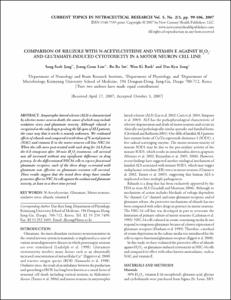COMPARISON OF RILUZOLE WITH N-ACETYLCYSTEINE AND VITAMIN E AGAINST H2O2- AND GLUTAMATE-INDUCED CYTOTOXICITY IN A MOTOR NEURON CELL LINE
- Keimyung Author(s)
- Lim, Jeong Geun; Baek, Won Ki; Song, Dae Kyu
- Department
- Dept. of Neurology (신경과학)
Dept. of Microbiology (미생물학)
Dept. of Physiology (생리학)
Brain Research Institute (뇌연구소)
- Journal Title
- Current Topics In Nutraceutical Research
- Issued Date
- 2007
- Volume
- 5
- Issue
- 2/3
- Abstract
- Amyotrophic lateral sclerosis (ALS) is characterized
by selective motor-neuron death, the causes of which may include
oxidative stress and glutamate toxicity. Although riluzole is
recognized as the only drug to prolong the life span of ALS patients,
the exact way that it works is mainly unknown. We evaluated
effects of riluzole and compared it with those of N-acetylcysteine
(NAC) and vitamin E in the motor-neuron cell line NSC-34.
When the cells were post-treated with each drug for 24 h from
the 6-h timepoint after 30-min H2O2 treatment, cell survival
was all increased without any significant difference in drug
potency. In the differentiated NSC34 cells to express functional
glutamate receptors, each of the three drugs co-treated with
glutamate was effective on glutamate-resistant cell survival.
These results suggest that the tested three drugs have similar
protective effect in NSC-34 cells against the oxidant and glutamate
toxicity, at least in a short-time period.
KEY WORDS: N-Acetylcysteine, Glutamate, Motor neurons,
oxidative stress, riluzole, vitamin E
- Publisher
- School of Medicine
- Citation
- Sang-Seob Jang et al. (2007). COMPARISON OF RILUZOLE WITH N-ACETYLCYSTEINE AND VITAMIN E AGAINST H2O2-
AND GLUTAMATE-INDUCED CYTOTOXICITY IN A MOTOR NEURON CELL LINE. Current Topics In Nutraceutical Research, 5(2/3), 99–106.
- Type
- Article
- ISSN
- 1540-7535
- 파일 목록
-
-
Download
 oak-aaa-01568.pdf
기타 데이터 / 683.32 kB / Adobe PDF
oak-aaa-01568.pdf
기타 데이터 / 683.32 kB / Adobe PDF
-
Items in Repository are protected by copyright, with all rights reserved, unless otherwise indicated.